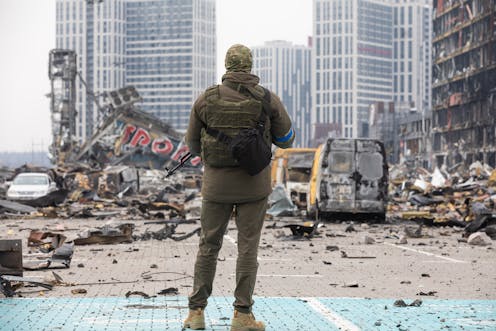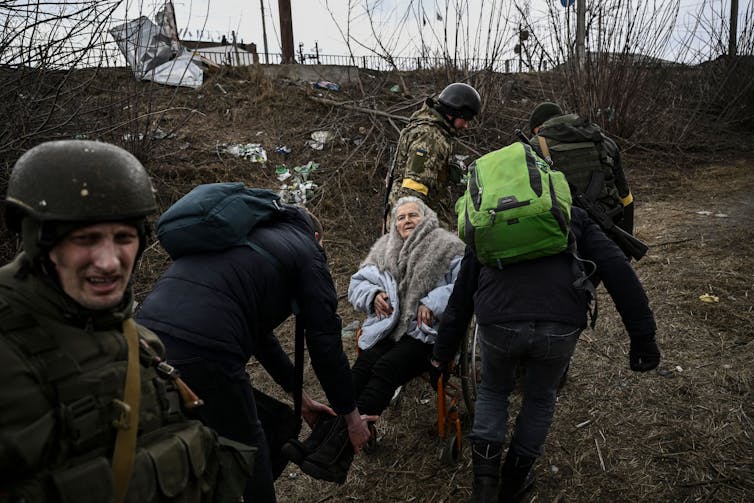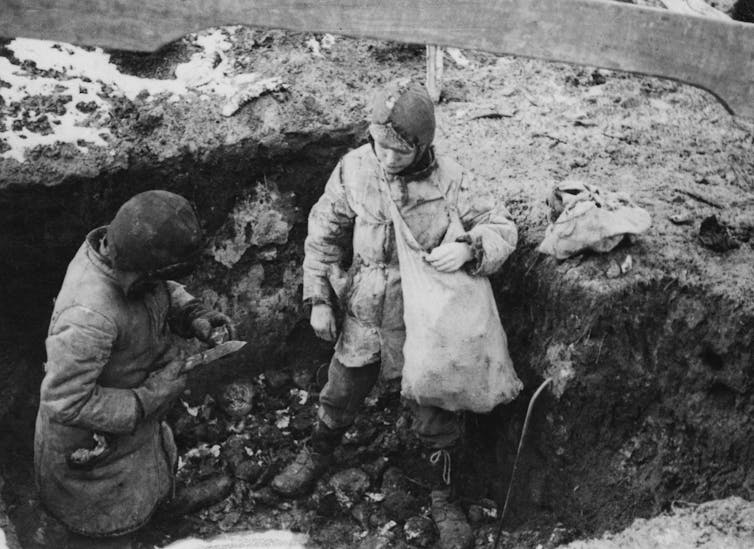
There’s a real threat that Russia will commit genocide in Ukraine. As evidence of war crimes emerges, there is reason to believe it may already be taking place.
“Russia’s forces have committed war crimes in Ukraine,” U.S. Secretary of State Antony Blinken said in a statement on March 23, 2022. Blinken cited as evidence for his allegation Russia’s destruction of “apartment buildings, schools, hospitals, critical infrastructure” and a maternity hospital in the besieged city of Mariupol that was marked with the Russian word for children.
Russia has killed at least 1,189 civilians and wounded 1,901 additional Ukrainians since it began its attack on Ukraine in February 2022, according to the United Nations. This actual death toll is likely much higher.
Such attacks on civilians during conflict are considered war crimes under international law.
But war crimes also often take place in tandem with other atrocity crimes – a legal term that also encompasses ethnic cleansing, crimes against humanity and genocide.
And indeed, there is evidence Russia has also committed crimes against humanity, or widespread attacks against Ukraine’s civilian population. Such attacks include killings, enforced disappearances, rape and torture.
These also include the mass deportations of Ukrainians into Russia that the Kremlin is reportedly carrying out in eastern Ukraine.
Some observers warn that this violence has the potential to become genocidal, particularly given Russian propaganda and physical destruction of Mariupol and other cities.
Ukrainian officials claim genocide has already begun. “The aerial bombing of a children’s hospital,” President Volodymyr Zelenskyy said on March 9, 2022, “is the ultimate evidence that genocide of Ukrainians is happening.”
Other experts disagree, sometimes arguing that the Russian violence doesn’t meet the legal requirements of genocide.
Given the scale of Russian violence in Ukraine, however, genocide warnings need to be taken seriously.
The field of genocide studies, in which I have long worked, has developed frameworks for assessing the threat of genocide in such volatile situations. These tools, including one used by the U.N., indicate Ukraine is indeed at considerable risk for genocide.

Historical precedent
Genocide refers to “acts committed with intent to destroy, in whole or in part, a national, ethnical, racial or religious group.”
These acts involve not just killing people, but seeking to destroy the target group by causing “serious bodily or mental harm,” creating harsh “conditions of life,” preventing births and “forcibly transferring” children to another group.
One predictor for genocide is a history of mass human rights violations and atrocity crimes, including genocide.
Russia has a long history of mass violence against Ukrainians and other groups.
Perhaps most infamously, the Soviet Union enacted land policies that prompted a food shortage and a famine, killing millions of Ukrainians from 1932 to 1933. This is known as the Holodomor, a Ukrainian word meaning meaning “death by hunger.”
Other Soviet atrocities include forced deportation of national and ethnic groups and massive political purges.
After the Soviet Union collapsed in 1991, Russia committed mass violence against civilians in Chechnya, Georgia and Syria. It bombarded and obliterated cities like Grozny in 1995 and Aleppo in 2016.

Political upheaval
Genocide and atrocity crimes are also strongly correlated with political upheaval, especially war. Such upheaval destabilizes a society and makes it less secure – especially for vulnerable groups of people who may be blamed for the political or economic instability.
Genocide has taken place during global conflicts, as illustrated by the Armenian genocide during World War I, and the Holocaust during World War II.
And then there are genocides associated with colonial conquest and invasion, like the destruction of Indigenous peoples in North America.
Such countries as China and Cambodia have also undertaken social engineering projects resulting in genocide.
Russia has experienced a number of political upheavals, including a current economic crisis. Russia’s invasion of Ukraine is the sort of armed conflict often associated with atrocity crimes.
Ideology and demonization
Genocide is justified by propaganda and language that devalues and demonizes target populations. Historical examples abound, ranging from European colonial caricatures of Indigenous “brutes” and “savages” to Nazi representations of Jews as rats.
Russia is using this type of demonizing language to justify its invasion of Ukraine. First, Russia depicts its violence as necessary to “denazify” Ukraine. President Vladimir Putin, for example, has referred to the Ukrainian leadership as a far-right “gang of drug addicts and neo-Nazis.”
And second, Putin has suggested that Ukrainian identity is not real and that, historically, “Russians and Ukrainians are one people – one nation, in fact.”

Understanding the risk
Proving genocidal intent is difficult, especially in a court of law. This is evident in current debates – including an ongoing court case at the International Court of Justice – about whether Myanmar committed genocide against the Rohingya people, a Muslim minority group.
But it can be inferred by patterns of violence consistent with the legal definition of genocide.
[There’s plenty of opinion out there. We supply facts and analysis, based in research. Get The Conversation’s Politics Weekly.]
Has Russia carried out genocidal acts?
Russia has targeted and killed civilians and reportedly forcibly deported hundreds of thousands of Ukrainians, including children, to Russia. It has bombed a maternity hospital.
Russia has also created “harsh conditions of life” in parts of Ukraine. It has destroyed electrical and water supplies, deprived Ukrainians of food and humanitarian aid and displaced more than 10 million people within and outside of Ukraine.
Russia seeks to seize and Russify Donbas and other parts of eastern Ukraine, where, if Putin is taken at his word, an “imaginary” Ukrainian identity will be erased.
There is a significant risk that Russia will commit genocide in Ukraine. It is possible that a genocide has already begun.
Alexander Hinton does not work for, consult, own shares in or receive funding from any company or organization that would benefit from this article, and has disclosed no relevant affiliations beyond their academic appointment.
This article was originally published on The Conversation. Read the original article.







